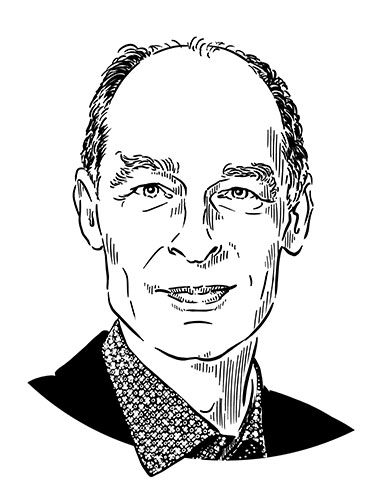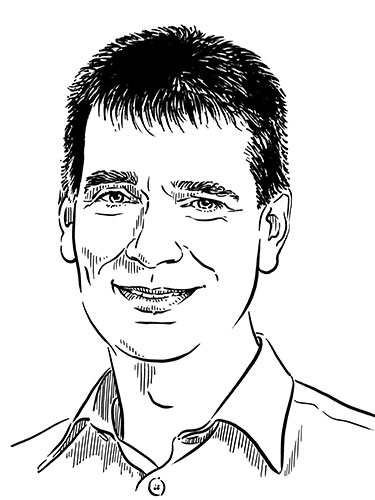An end to endless growth?!
Text: Samuel Schlaefli
Environmental economist Frank Krysiak and environmental ethicist Andreas Brenner agree on one thing: Our economy needs to become more sustainable. Should we have to reject the growth paradigm in order to achieve that goal? Three arguments for and against a post-growth economy.
Pro
1. No sustainability without sacrifice
«All this talk about green growth and the circular economy has largely been an exercise in political marketing. They’re trying to convince the electorate that it’s possible to just keep on consuming resources guilt-free. But even recycling requires resources in the form of energy. Nicholas Georgescu-Roegen, whose work helped establish the concept of ecological economics, has been studying the biophysical limits of our dominant economic model since the 1970s. He helped pioneer the concept of ‘degrowth’ and realized that it’s not possible to achieve unlimited growth within a limited system. But in spite of that fact, the idea of unlimited growth continues to serve as a kind of collective delusion in the industrial economy. In truth, there is only one option open to us: We’ve got to put the brakes on our consumption! And by ‘we,’ I mean the wealthy populations of rich, industrialized countries. There’s an oft-cited argument that consumption by the rich helps the poor catch up financially, but I don’t find it at all compelling. If we consume more, how is that supposed to help the around one billion people living in abject poverty? On the contrary, rich countries pressure poorer countries to build up their entire economies around resource extraction. The poor countries are trapped in these dependent economic relationships and are forced to acquiesce to the destruction of their natural environment.»
2. Growth without gain
«In industrialized nations, economic growth no longer improves our quality of life, and it hasn’t for a long time. It’s quite the opposite, actually. We keep ratcheting up the tempo – and digitalization plays a significant role here – so nobody has any time to think, let alone enjoy their lives. Marketing creates an inherent drive for us to want to own more and develop our personalities through consumption. The work of American philosopher Michael Sandel shows how almost all areas of our society – including education and healthcare – have now been economized. Even the destruction of the natural world has been commercialized within the framework of contemporary CO2 trading schemes.»
3. The common good instead of utilitarianism
«Utilitarianism, which is the philosophy underpinning capitalism, is focused solely on material accumulation. The growth paradigm has relegated what really matters in life to an afterthought – namely, meaning instead of quantity. Even Aristotle believed it was friendship that made life worth living and that humans are political beings with a desire to engage in communities. Many people strive to develop positive relationships with others and with the environment. But living in a profit-oriented economy certainly doesn’t make it easy to live that kind of life. However, there is an alternative: a global economy that values the common good over material wealth gained at the expense of other people and the natural world.»
Contra
1. Qualitative growth is the solution
«Post-growth is largely a ‘First World’ idea. You won’t find much support for the notion in places like Zambia and Ethiopia. On a purely objective level, there are many parts of the world where quantitative economic growth is imperative. If people are hungry, it means they need more food. That’s why it’s important to differentiate between quantitative and qualitative growth. The latter is limited only by human ingenuity, the creativity to transform the same natural resources into a better quality of life. Take organic meat, for example; I pay more for it than I do for factory farmed products. If I cut my meat consumption in half but spend three times as much on the meat I buy, that’s still growth and it ultimately raises the GDP. Or consider smartphones, for instance: You can buy a cheap phone once a year or purchase a more expensive, robust model that’s easy to repair once every five years. Most people would prefer the latter option, and it would be better for the environment as well. Add to that the fact that it is possible to achieve our climate goals today using renewable energies, even if energy consumption were to increase. We have to recognize the importance of decoupling economic growth from resource use.»
2. Innovation instead of compulsory sacrifice
«Sufficiency can be a productive idea so long as we wield it responsibly and leave room for people to make their own decisions. But it won’t work if our goal is to mandate austerity and exhort people to lower their expectations when it comes to the quality of their lives. The way I see it, the aim is to offer different perspectives on how to lead a fulfilling life. We see that very clearly in mobility: around 50 percent of households in the Canton of Basel-Stadt no longer own a car. The important thing is to provide people with opportunities to experiment with these types of alternative lifestyle concepts. Our research shows that when simply presented with the opportunity to try alternatives at very little cost – without any pressure or political propaganda – people can be surprisingly willing to experiment. But we should not rely on this exclusively, political measures and incentives are important as well.»
3. Self-interest must remain a central driver of green growth
«The idea of an ‘economy for the common good’ is nothing new. In fact, it was widespread in the former Eastern Bloc states. It didn’t work. Personal gain is an extremely strong incentive for many people, and we shouldn’t underestimate the power of the drive to act in one’s own interest. We can be far more successful if we channel that self-interest for the common good instead of trying to fundamentally uproot it. And when it comes to green growth, that approach can be very powerful indeed.»
Andreas Brenner is an honorary professor of philosophy at the University of Basel and professor at the University of Applied Sciences and Arts Northwestern Switzerland (FHNW) in Basel. His research focuses on questions of environmental and economic ethics.
Frank Krysiak is a professor of environmental economics at the University of Basel. His research focuses on the effects of economic policy and the economic theory of sustainability.
More articles in the current issue of UNI NOVA.


